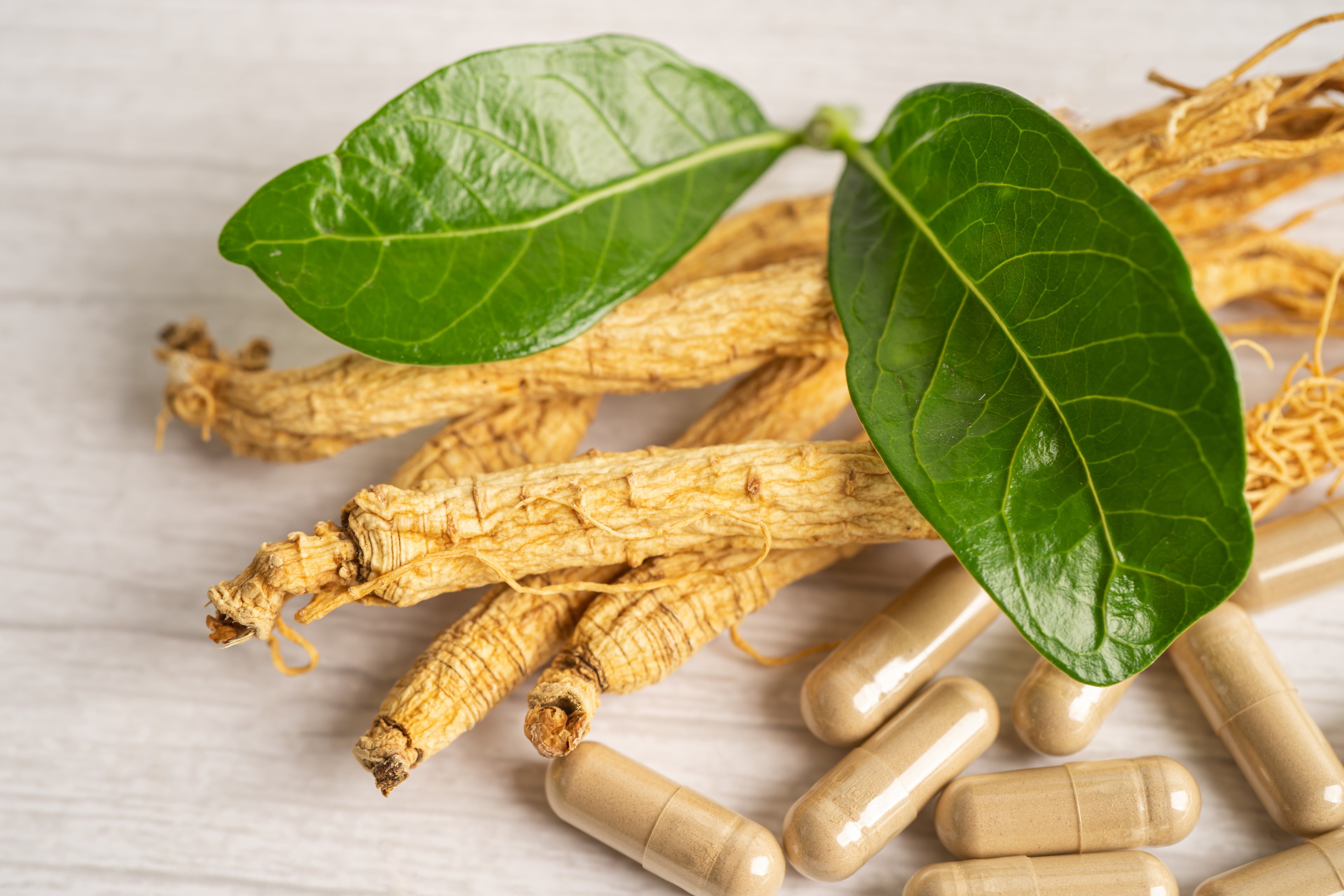Ashwagandha vs Tongkat Ali: Adaptogen Showdown
Adaptogens have been used for centuries in traditional systems like Ayurveda and Southeast Asian medicine. Today, they’re gaining traction in sports nutrition, stress management, and hormone health.

Two of the most talked-about are ashwagandha (Withania somnifera) and tongkat ali (Eurycoma longifolia, also called longjack). Both are promoted as natural ways to support energy, vitality, and hormonal balance.
But how do they actually work? What does the research say? And which one fits your goals best?
A 2021 meta-analysis found that ashwagandha supplementation was linked with improved stress resilience and reduced cortisol levels in healthy adults (1). Meanwhile, tongkat ali has been studied for its potential to support healthy testosterone levels and reduce perceived stress in both men and women (2;3).
This article breaks down the science, benefits, and practical applications of each, so you can see where they overlap, where they differ, and how lifestyle factors like sleep, training, and nutrition make the biggest difference.
What Is Ashwagandha?
Ashwagandha is an adaptogenic herb native to India, long used in Ayurveda.
It contains bioactive compounds called withanolides, which are believed to influence stress pathways, cortisol regulation, and sleep quality (4).
Modern research has positioned ashwagandha as one of the most evidence-backed adaptogens for stress reduction and recovery support.
What Is Tongkat Ali?
Tongkat ali, or Eurycoma longifolia, is a medicinal root native to Malaysia and Indonesia.
Traditionally used as a tonic, it’s now studied for its effects on energy, libido, and hormone support.
The root contains quassinoids, compounds that may influence stress hormones and support the body’s anabolic processes (5).
Science & Evidence
Ashwagandha Research
- Stress and Cortisol: A double-blind study found that adults taking ashwagandha had a 28% reduction in serum cortisol after 60 days (6).
- Sleep: A 2020 trial in the journal Cureus showed that 300 mg/day of ashwagandha extract improved sleep onset latency and sleep efficiency in adults with insomnia (7).
- Performance: A study published in Journal of the International Society of Sports Nutrition (2015) found ashwagandha supplementation improved strength and recovery markers in resistance-trained men (8).
Typical dosage range: 300–600 mg/day of standardized root extract (5% withanolides).
Tongkat Ali Research
- Hormonal Support: A 2012 randomized trial found tongkat ali supplementation increased testosterone levels in middle-aged men with low baseline values (2).
- Stress & Mood: A 2013 study in Journal of the International Society of Sports Nutrition showed that tongkat ali reduced tension, anger, and cortisol levels in moderately stressed adults(3).
- Performance: Early studies suggest improved muscle strength and body composition when paired with resistance training, though data is less robust than ashwagandha.
Typical dosage range: 200–400 mg/day of standardized root extract.
Benefits of Ashwagandha
- Stress Resilience & Cortisol Regulation: Ashwagandha supports the body’s stress response system by moderating cortisol, helping balance energy throughout the day (6).
- Sleep Quality & Recovery: Linked to better sleep onset and efficiency, making it a recovery-supporting adaptogen (7).
- Strength & Performance: Support Studies suggest improvements in VO₂ max and resistance training outcomes (8).
Benefits of Tongkat Ali
- Healthy Testosterone Support: Some trials show increases in testosterone in men with low levels, making it popular for energy and vitality (2).
- Stress & Mood Balance Associated with reduced cortisol and improved mood states like tension and anger. (3)
- Energy & Physical Endurance Traditional use and limited studies point to improved energy and stamina (5).
Practical Applications: Which One Fits Your Goals?
- If your primary concern is stress, sleep, or recovery, ashwagandha has the stronger and broader evidence base. Multiple clinical trials show it lowers cortisol, improves sleep quality, and indirectly supports testosterone and fertility, especially in men experiencing stress, fatigue, or infertility. Its hormone benefits often come as part of its stress-regulating effect.
- If your focus is more on vitality, energy, or direct hormonal balance, tongkat ali may be more relevant. Studies suggest it can raise testosterone and lower cortisol in moderately stressed individuals, supporting energy, libido, and mood. While the clinical evidence is smaller compared to ashwagandha, tongkat ali is often chosen for its more targeted role in men’s health.
Both herbs complement, but don’t replace, the fundamentals: quality sleep, nutrition, and strength training. No adaptogen works in isolation, and their benefits are maximized when paired with a solid lifestyle foundation.
Pro Tip: Some formulations combine both herbs for complementary effects — stress resilience from ashwagandha plus vitality support from tongkat ali.
The STRIV Labs Angle
At STRIV Labs, we don’t believe in single-ingredient quick fixes. That’s why Peak Potential includes both Ashwagandha and Tongkat Ali, two adaptogens that complement each other.
- Ashwagandha: backed by strong clinical research for stress resilience, cortisol regulation, sleep quality, and recovery.
- Tongkat Ali: studied for its role in supporting vitality, energy, and healthy hormonal balance.
By combining them into a broader 12-in-1 vitality stack, Peak Potential is designed to support the systems that matter most (sleep, training, nutrition, and long-term consistency) instead of chasing short-term spikes.
This synergy-first approach is what makes STRIV different: we focus on whole-body performance, not just isolated outcomes.
Final Word
Ashwagandha and tongkat ali are two of the most studied adaptogens for stress, vitality, and recovery. While their strengths differ, both can play a role in a balanced lifestyle that prioritizes sleep, training, and nutrition.
FAQs
Does ashwagandha increase testosterone?
Research shows ashwagandha may indirectly support testosterone by lowering cortisol, but it is not a direct testosterone booster.
Can women take tongkat ali?
Yes, emerging research suggests stress and mood benefits in both men and women, though most testosterone data is male-focused.
Can I take both together?
Yes. Some stacks combine them, targeting stress resilience (ashwagandha) and vitality (tongkat ali).
How long until I see effects?
Most studies report noticeable changes within 4–8 weeks of daily use.
References
-
Lopresti AL, et al. J Altern Complement Med. 2021;27(6):491-502. “A systematic review and meta-analysis of ashwagandha for stress and anxiety.”
-
Tambi MIBM, et al. Asian J Androl. 2012;14(5):667–674. “Eurycoma longifolia Jack in managing idiopathic male infertility.”
-
Talbott SM, et al. J Int Soc Sports Nutr. 2013;10:28. “Eurycoma longifolia supplementation improves stress hormone profile and mood state.”
-
Singh N, et al. Phytother Res. 2011;25(8):1148–1154. “Withania somnifera (Ashwagandha): a review.”
-
Low BS, et al. Phytother Res. 2013;27(4):531–545. “Eurycoma longifolia: review of its pharmacological properties.”
-
Chandrasekhar K, et al. Indian J Psychol Med. 2012;34(3):255–262. “Adaptogenic effect of ashwagandha root extract.”
-
Langade D, et al. Cureus. 2020;12(2):e7083. “Clinical study on the efficacy of Ashwagandha root extract in insomnia.”
-
Wankhede S, et al. J Int Soc Sports Nutr. 2015;12:43. “Examining the effect of Withania somnifera on muscle strength and recovery.


